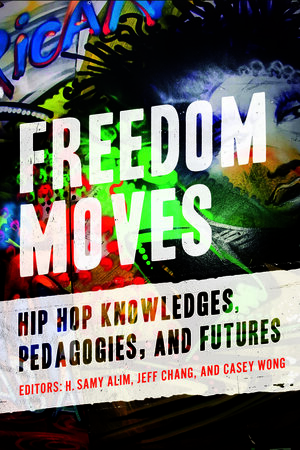H. Samy Alim, Jeff Chang, and Casey Wong - Freedom Moves: Hip Hop Knowledges, Pedagogies, and Futures
Written by Chi Chi Thalken on March 22, 2023Jeff Chang is a writer best known for his book Can’t Stop Won’t Stop: A History of the Hip-Hop Generation. H. Samy Alim directs the Hip Hop Initiative at UCLA, and is the author of Neva Again: Hip Hop Art, Activism, and Education in Post-Apartheid South Africa. Casey Philip Wong is Assistant Professor at Georgia State University, and author of the forthcoming Pray You Catch Me: A Critical Feminist and Ethnographic Study of Love as Pedagogy and Politics for Social Justice. These three got together some years ago to start putting together panels across the globe to bring different voices and perspectives together and create some necessary discussions around hip hop. The results of these conversations are now available in one collection, Freedom Moves: Hip Hop Knowledge, Pedagogies, and Futures.
The way this book is constructed is to more or less give you a transcript of these different panels, to drop you right in the middle of these different discussions. These can range from discussions of the role of hip hop leading people through Post-Apartheid South Africa or sustaining revolution in Palestine or Syria, it’s role in the fight for Indigenous rights in the U.S., it’s role in the classroom, or how it’s being used in the fight for disability rights or the rights of the LGBT community. Whatever it is, there are a lot of really insightful and thoughtful conversations in this book involving a lot of people who have put a lot of sweat and blood into what they are doing. As a result, it is the type of book that can be a lot to take in the first time through. The good news is that it makes for an excellent reference with all of these different chunks devoted to different issues that are waiting for you dive back into and use as a jumping off point once a particular issue grabs your attention. Surprisingly, the least interesting part of the whole book is the first section, which features a discussion between Rakim, Chuck D, and Talib Kweli. While there isn’t a particular date for the talk, it does appear to be prior to 2020, because there is a moment in the introduction when Kweli gets a shout out for his Twitter game, which made me cringe when I read it. That aside, it’s the talk that generates the least new content for those that are interested in this subject matter. No disrespect to Chuck D or Rakim, but they’ve been doing this for years, and there isn’t a particular angle to this panel to steer them to say something new or compelling. That said, the rest of the book is incredibly enlightening, with all sorts of points of view from people all over the globe from all walks of life that are using hip hop to not just make dope music, but to educate and change the world for the better. It’s a great tool to get you started on your path to learning more about hip hop as a global force for change.
Freedom Moves is a compelling collection from Alim, Chang, and Wong. They clearly put in a lot of time and energy assembling everything contained within the book, and they reached out to all sorts of interesting experts from around the world to weigh in and make this text as rich as possible.
| Title: | H. Samy Alim, Jeff Chang, and Casey Wong (Editors) - Freedom Moves: Hip Hop Knowledges, Pedagogies, and Futures |
|---|---|
| Label: | University of California Press |
| Year: | 2023 |
| Rating: | 8/10 |

